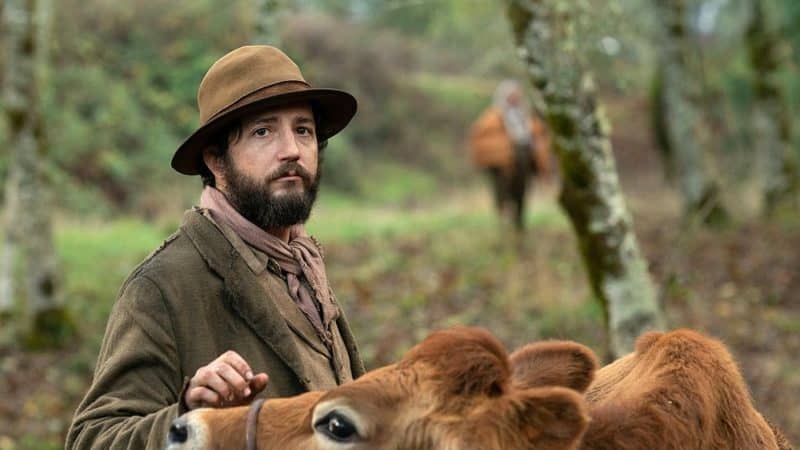The Productivity Commission recently defined the country’s top 10 exporting companies as frontier firms. They were progressive, innovative, forward-thinking and outward-looking.
America has produced a rich vein of frontier films to depict the expansion of foreign settlers into lands occupied by indigenous peoples.
New Zealand, too, has depicted its frontier period, the most notable being TV’s The Luminaries and The Piano. In some circles, the term “frontier” denigrates indigenous cultures.
Kelly Reichardt’s First Cow (Madman) shows the gulf between Oregon in 1820, and the sophisticated cities on the east coast. In the former, fur trappers are exploiting the main source of value to the outside world.
An indigenous chief, meanwhile, scoffs at the trappers’ desire for a fashion item, when he sees something as only worth eating. The primary concern for both is scarcity; specifically, the lack of manufactured textiles, tools and agriculturally-produced food.
The title tells the story, as the trading outpost’s Chief Factor (Toby Jones) ships in a dairy cow, while the trappers drink away their profits.
The plot deepens when two trappers — a baker (John Magaro) who is unable to find much to cook except fish and mushrooms, and an entrepreneurial Chinese immigrant (Orion Lee) — surreptitiously milk the cow by night and sell their tasty treats.
They quickly become rich as the trapper community relishes the rare fried goodies far more than the more copious supplies of liquor and salmon.
Naturally, questions are asked about the secret ingredient of these illegally sourced dairy delights and consequences follow.
The story is partly based on a more sweeping novel, The Half-Life, by Jonathan Raymond, who provides the screenplay. Its value judgments are critical of frontier capitalism — the depletion of natural resources in exchange for tradable items such as shells, buttons and company scrip (share certificates).
It is also about the trappers’ bond of friendship, which contrasts with the more ruthless calculations of the Chief Factor, who weighs the merits of punishment for those who break his rules against its impact on others who may also be so inclined.
Events move at a cautious pace, requiring patience from the viewer, as contrasts emerge in the baker’s empathy with the cow and the ambitions of his risk-taking Chinese colleague.
Reichardt’s quest for authenticity is carefully nuanced to see the potential for a beneficent society arising from frontier hardship. The chief and his tribeswomen, for example, have adapted to meet the trappers’ existential needs, and in return gain western garments and fashion accessories.
Sadly, all of Reinhardt’s films have been bedevilled by limited distribution. These include Wendy and Lucy, Meek’s Cutoff, Night Moves and Certain Women. First Cow is late arriving after being widely acclaimed by American critics when first shown in 2019.
Rating: Parental guidance. 122 minutes.
Clips
The United States vs Billie Holiday (Universal)
Musical biopics share common characteristics, and director Lee Daniels ( Precious , The Butler ) ticks most of the boxes with a heavy duty message. Jazz singer Holiday’s battle with heroin addiction, alcoholism and poor choice of men was previously canvassed in Lady Sings the Blues (1972, with Diana Ross), based on an autobiography, and foreshadowing newer movies such as Judy (Judy Garland) and I am Woman (Helen Reddy). Daniels’ fresh angle is racial politics and Holiday’s persecution by FBI drug commissioner Harry Anslinger (Garrett Hedlund), based on the flimsy excuse that her signature anti-lynching song, Forbidden Fruit , incited racial unrest. The FBI was similarly obsessed with Jean Seberg (Seberg). After trying to compress Holiday’s early career, the plot finally narrows to a fictional love affair with an FBI agent (Trevante Rhodes). Andra Day’s performance as Holiday has been justifiably recognised and, as she appears in nearly every scene, overshadows all of the flaws. Rating: Restricted to over 16. 130 minutes.
Things Heard and Seen (Netflix)
A rambling country mansion and a troubled marriage provided a winning formula in The Nest , released earlier this year. It is used again when an ambitious and untrustworthy academic (James Norton, Mr Jones , The Nevers ) moves his reluctant wife (Amanda Seyfried, Mank , First Reformed ) and child to upstate New York for his first teaching job. The house quickly reveals its lack of welcome, with ghostly appearances and unusual movements. The wife, whose anorexia disguises repressed emotions, finds spiritual comfort in the strange happenings, while the husband continues his lying and cheating ways. Eventually their conflicts and resentments become entangled with the supernatural elements. Based on a novel, All Things Cease to Appear , by Elizabeth Brundage, the adaptation by writer-director couple Shari Springer Berman and Robert Pulcinin ( The Nanny Diaries ) blends horror and melodrama, without making the most of either genre. Netflix rating: 16+. 121 minutes.
Love and Monsters (Netflix)
Young love confronts entomological monstrosities in a post-apocalyptic world where all but 5 per cent of the population has been wiped out. For the survivors, life is restricted to underground bunkers due to the threats from the large insects, who thrive in the lush surroundings. A young but nervous man (Dylan O’Brien, The Maze Runner ) makes radio contact with an ex-girlfriend (Jessica Henwick) and decides to seek her after seven years, though she is some 140km away. His journey takes up the rest of the story, as he fights off master attacks and encounters, among others, a female robot called Mavis, and teams up with a resourceful Blue Heeler. A climax involves some baddies with a luxury cruiser and a giant crab. The computer graphics were Oscar-nominated this year, and the location photography in tropical Queensland is stunning. This is a young adult-oriented Hollywood studio production (Paramount) of near-Jurassic proportions, that makes few shortcuts, except for the lack of big-name stars. It is set up for a sequel, but its cinema release fell victim to Covid-19. Michael Matthews directed from a screenplay by Michael Robinson and Brian Duffield, who provided the story. Netflix rating: 13+. 109 minutes.

Reader Interactions